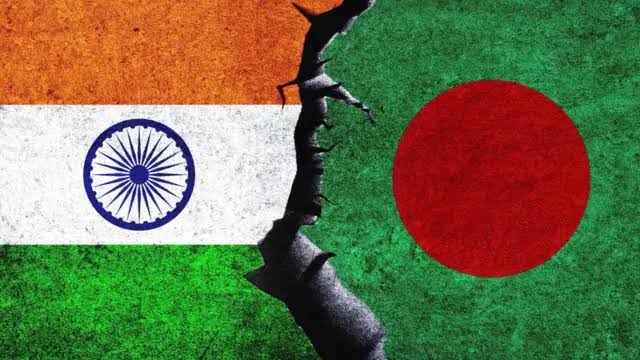Published: / Times Read

Since the post-war period of 1971, India has continued to exert influence over Bangladesh in various ways. This is because we have placed India on a pedestal as our greatest ally in our independence. However, while the motives behind India's assistance during the Liberation War are somewhat clear, successive governments have never allowed the people to fully understand them.
Despite India's aggressive stance behind a mask of friendship, our voices of protest have remained subdued. Whenever an attempt was made to raise concerns, the Indian-backed lobby silenced dissent through abductions, murders, and assassinations. A burning example of this is the brutal killing of BUET student Abrar Fahad.
Those in power have always sought to stay in India's favor to retain their positions. Particularly in the past 15 years, India has established a stronghold in Bangladesh, and its primary tool was the defeated Awami government. Without the people's mandate, this government ruled Bangladesh for 15 years with India's support, allowing India to take whatever it wanted, whenever it wanted.
We were made to believe that India is our eternal friend, with ties akin to that of a married couple or blood relatives. However, this relationship was solely between India and the Awami government, not with the people of Bangladesh. India realized this when Narendra Modi visited Bangladesh.
During Modi's visit, the government launched an unjustified crackdown on the general public, as well as on mosques and madrassas. Everyone witnessed this. Why did the fugitive Sheikh Hasina-led government target religious institutions and scholars? The reasons were twofold: first, to convince Modi that without Sheikh Hasina in power, Bangladesh would be taken over by religious extremists; and second, to demonstrate that only Sheikh Hasina's government was capable of suppressing such elements.
To prove her brutal nature, Sheikh Hasina resorted to ruthless violence, taking innocent lives and attacking religious institutions, deeply wounding the sentiments of the devout people. The world saw the explosion of this outrage on August 5.
The second major tool India used was ISKCON. Although ISKCON has a physical presence in Bangladesh, its soul remains in India. Many of its members believe that Bangladesh is controlled by India and that it is essentially a province of India. Sheikh Hasina served as a puppet ruler of this so-called province. A glaring example was the January 7, 2024, rigged elections, where Indian-backed candidates shamelessly asserted their dominance.
India's blatant interference in Bangladesh’s elections is no secret, with figures like Sushma Swaraj and Pranab Mukherjee openly influencing election outcomes.
Over the past 15 years, ISKCON has been systematically trained to safeguard the authoritarian regime, led by individuals like Naufel. When Sheikh Hasina fell from power and various counter-revolutionary attempts failed, ISKCON was deployed to incite communal riots, including the assassination of a state-appointed lawyer in broad daylight. This was a calculated attempt to destabilize Bangladesh. However, the revolutionary government and the people of Bangladesh quickly unraveled this plot.
By neutralizing the ISKCON conspiracy through patience and national unity, the government of Dr. Yunus delivered a resounding diplomatic blow to India. Unable to digest this setback, India's foreign ministry reacted furiously to a minor incident involving an expelled ISKCON leader, Chinmoy Das—an unprecedented move in Indian history.
India assumed that Bangladesh was still operating under the pre-August 5 political framework, where threats and coercion would secure compliance. However, they failed to recognize that this is now a revolutionary government. This reluctance to acknowledge reality is why India is hesitating to formally recognize the new government.
India must understand that the people of Bangladesh have broken free from the chains of subjugation and have learned to claim their rights. The events of August 5 stand as undeniable proof. India must accept this reality when shaping future relations, or else it risks losing Bangladesh as a strategic ally—just as it has with Nepal, Bhutan, Maldives, and Sri Lanka. Such a loss would be highly detrimental to India's geopolitical interests.
Bangladesh has never truly reaped any benefits from its relationship with India. This has always been a one-sided and imbalanced relationship. While Bangladesh has little to lose from reassessing this dynamic, India stands to suffer significant losses, including:
Losing access to its Seven Sister states.
A decline in its trade surplus with Bangladesh, which stood at $10.63 billion in the fiscal year 2022-23.
Increasing influence of China and Pakistan in Bangladesh.
A collapse in India's medical tourism and general tourism industries.
Heightened border tensions.
Escalating internal problems within India, potentially leading to further regional fragmentation.
Md. Fakhrul Islam